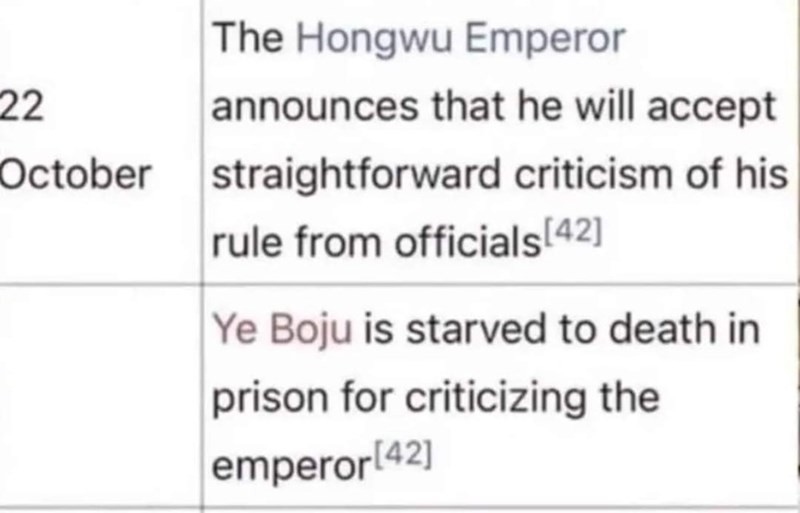emperor genuinely killed someone who was loyal like he fucking trusted you to keep by your word you really fucking lost an ally or more God damn such a fumble
A Comm for Historymemes
A place to share history memes!
Rules:
-
No sexism, racism, homophobia, transphobia, assorted bigotry, etc.
-
No fascism, atrocity denial, etc.
-
Tag NSFW pics as NSFW.
-
Follow all Lemmy.world rules.
Banner courtesy of @setsneedtofeed@lemmy.world
The best thing is that Ye Boju criticized the emperors harsh punishment of officials:
"The emperor himself solicited criticism of his harsh treatment of the officials in the prestamped documents case. Responding to unusual and inauspicious activity by the stars and planets, in a conventional gesture, he announced on 22 October 1376 that he would accept straightforward criticism of his rule from officials. Yeh Po-chii's response was the most detailed and the most devastating. Yeh was then serving in P'ing-yao, southwest of T'ai-yiian in Shansi. When the emperor read Yeh's criticisms, he became furious and ordered him brought in chains to Nanking. Yeh died of starvation in prison not long afterward. His criticisms dealt with three major problems in Ming rule: the enfeoffment of the princes of the blood and their command of military forces; the emperor's reliance on extremely harsh punishments; and the excessive haste with which the emperor moved to establish the institutions of his rule."
The book uses an older romanization of Chinese than the Wikipedia article.
Twitchett, Denis (1998), The Cambridge History of China Volume 7 The Ming Dynasty, 1368—1644, Part I, Cambridge University Press, Page 135f.
Ye Boju spent the rest of his life appreciating several key facts:
- he was not an official
- he criticized the Emperor instead of his leadership
- acceptance of his criticism was not protection from retaliation
Accepting criticism and not punishing for it are two very different things.
To be pedantic, it is not specified whether Ye Boju was an official and it says he criticized the emperor himself and not "his rule".
Freedom of speech was given, freedom after speech was not.
